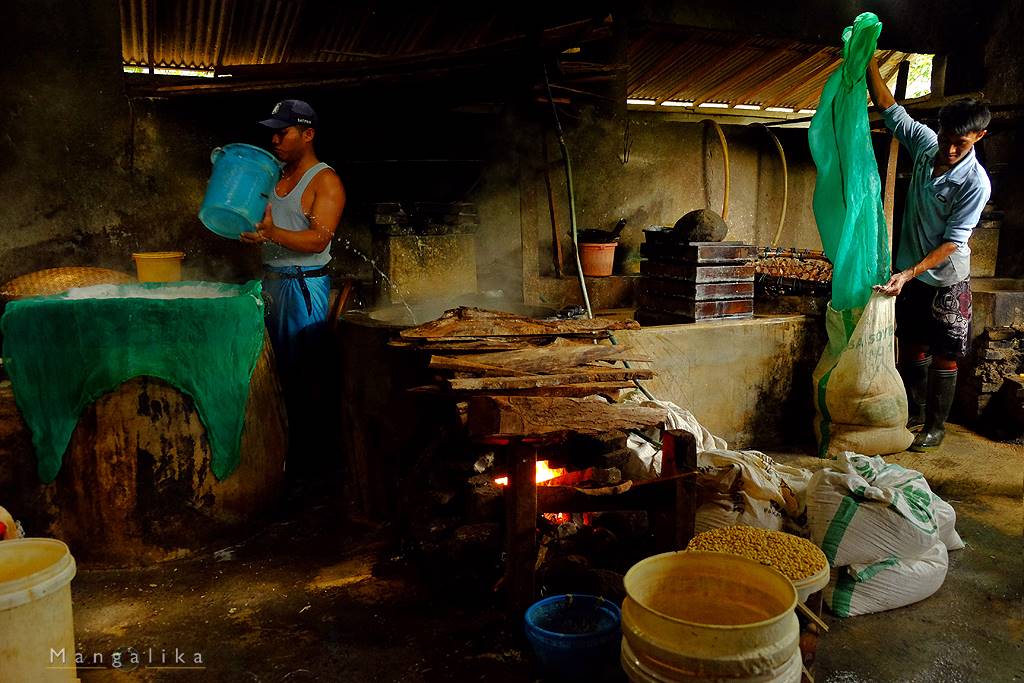As you take this name ‘Borobudur’, the vital keywords which cross through your mind must be the mystic ancient temple, buddha, history, monument, world heritage site etc. Many tourists who already visited the Javanese province might also tell you just the stories of this magnificent monument which is also a UNESCO site. There is no doubt that the temple has all excellence to steal the major attention of visitors.
But only if the ‘explorer’ in you can not stay calm without checking the surroundings you may just discover this ‘other side’ of Borobudur. Three to four kilometers away from the main temple, there is a picturesque village, called ‘Tanjungsari’. It is also popular as ‘Tofu village’ because of the scattered tofu or tahu-making old workshops. Public transport or a cab is an almost-impossible option to reach there. Probably a bi-cycle or a bike and a local map can be the saviors. We took an extra step ahead. Instead of renting a bike we ‘rented’ the bike shop owner himself! That was one of those funny travel-moments which still make us laugh. The guy got puzzled when we approached him, saying ‘we don’t want your bike, we want you to take us there’! It was a lesson from all our past trips, local’s help is a ‘must’ to explore a non-touristy place when you do not know the language.
So after a minute of negotiation, the friendly owner got ready to give us a ride. His friends encouraged him on his new job! 😉
Tanjungsari is a beautiful Indonesian village, surrounded by the Menoreh Hills and green landscapes. Our newly appointed guide happily took us to the first workshop. It was owned by a middle aged person ‘Sumbi’. The sign board was half broken and the exterior of the workshop was not at all interesting. It looked like another village home. But after getting inside we found an old, Javanese workshop full of traditional utensils and no automatic machines. Only one worker was there. He greeted his new visitors with a big, hearty smile. There you see the universal innocence of a village culture!
Directional light from the wooden roof and walls had already given an amazing rustic look to the in-house workshop. The entire setting automatically triggered our hands to take out the gears.

The tofu-worker explained us the traditional process of making tofu, the white and healthy blocks, we often include in our daily diet.

It is then simmered in hot water until foamed up and strained through white clothes inside wooden blocks.


After pressing down with wooden heavy blocks, the tofu bar takes a perfect shape

Working constantly beside an ever steaming tofu tub really seems a challenge in the hot and humid weather of Borobodur.

We visited few more such workshops and all still continue the old, local process of tofu-making. Some in house workshops are run by the various members of same family. The art of tofu-making is thus passed through generations.






Since ages, Tofu is an extremely popular food in South East Asian’s daily meals. Hence these workshops, although still manual, do not face much crunch in demand. They send batches of fresh or fried tofus to the local market. In an era of artificial intelligence and automation, there are still few parts, left in the world, which remind you about some old movie-scenes. This place was definitely one of them and I will specially remember Tanjungsari because of the picturesque traditional workshops and the friendly people out there. ‘Slow travel’ always offers something special that is often missed by usual tourists.
This article also appeared in Airasia’s travel smith’s page.
My other photo stories can be found here

